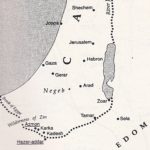“And Yahweh regretted that he had made mankind on the earth and he was grieved to his heart” (Gen 6:6). We have already discussed the Yahwist’s anthropomorphic portrait of Yahweh [or if you’ve missed it see: Conflicting portraits of Israel’s deity], so there is nothing surprising in this characterization of the deity in this verse. The Hebrew word, nehem, in this passage describes a change of heart or mind, and isRead More
Category: Samuel
#153. Who judges the people: the Aaronid priests OR the Levites OR the elders OR the prohets? (Ex 28:30; Lev 13; Num 5:16-28 vs Deut 17:8-13 vs Ex 18:13-26 vs 1 Sam 7:15, etc.)
#154. Who carries the Urim and the Thummim: the Aaronid high priest OR the Levites? (Ex 28:30 vs Deut 33:8-10)
As a composite text of competing ideologies and theologies, the Bible—the creation of a later generation of readers living centuries after these once individual texts were written (see What is the Bible?)—preserves multiple origin stories relating the establishment of its judiciary and who ministers judgment. Indeed, these competing texts do share one definable common feature: Yahweh is the ultimate Judge. It is he who judges. But what is variously represented inRead More
#220. Are the Levites allowed to touch the holy objects of the Tabernacle OR not? (Deut 18:1-8; 1 Sam 6:13-19; 2 Sam 6:6-7, etc. vs Num 4:1-19)
Nowhere is the agenda, and polemic, of the Aaronid priestly guild and its text, the Priestly source, more apparent than in its treatment and depiction of its rivals, the Levites. In this text, mainly Exodus 35–Numbers 10, our Aaronid writer has Yahweh proclaim on numerous occasions that: no non-Aaronid Levite can be a priest, only an Aaronid can (#152) no non-Aaronid Levite can eat of Yahweh’s sacrifices, only Aaronids can (#177)Read More
#226. The Ark of Yahweh: an empty throne seat which served a martial function OR the holy of holies which served a ritual function? (Num 10:33-36, 14:44-45; 1 Sam 4:1-7 vs Ex 25:22, 37:1-9; Lev 16:11-17; Num 4:5-15)
At Numbers 10:33, attributed to J, we are abruptly introduced to a story about the Ark of the covenant of Yahweh, which is portrayed in a very unique role. And it was, when the Ark traveled that Moses said “Arise Yahweh and let your enemies be scattered, and let those who hate you flee from your presence.” (Num 10:35) In this passage, as in others, the Ark of Yahweh is beingRead More
#254. Who can burn incense in front of Yahweh: only Aaronids OR not? (Ex 30:7; Num 17:5; 1 Chr 23:13; 2 Chr 26:16-19; Lk 1:8-11 vs Deut 33:10; 1 Sam 2:28; 1 Kgs 9:25)
The message endorsed through the tale of Korah’s rebellion in Numbers 16-17—that only the Aaronid priests can offer incense to Yahweh and only at Yahweh’s altar—is yet but another story in a long list meant to legitimate the Aaronid’s sole right to minister to Yahweh. We have now seen in this Aaronid written text, the Priestly source, “Yahweh” endorse: the sole selection of the Aaronids as his priests, while at theRead More
#299. Does Yahweh make an eternal covenant with the Aaronid priesthood via Phinehas OR with the Levitical priesthood in general OR with only the Zadokite line OR with the Davidic line OR with Jesus Christ via Melchizedek? (Num 25:6-13 vs Deut 18:1-5, 33:8-10; 1 Sam 2:28; Jer 33:18-22; Mal 2:4 vs 1 Sam 2:35; Ezek 40:46, 43:19, 44:15-16 vs Ps 110:4 vs Heb 7:11-25)
As a collection of diverse writings spanning roughly a thousand years, the Bible itself bears witness to the internecine priestly rivalries that plagued ancient Israel, and in one case even extended into the Christian era. And as is apparent from this entry’s title, each of these competing priestly guilds wrote a text whose purpose was to legitimate their guild’s right to be Yahweh’s sole anointed priests forever. In this rather lengthyRead More
#343. What were the borders of the land of Canaan promised to the patriarchs by Yahweh: from the brook of Egypt to the Euphrates OR from the Red Sea to the Euphrates OR from the Wilderness to Lebo-Hamath OR from Beersheba to Dan (Gen 15:18; Deut 1:7, 11:24; Josh 1:4 vs Ex 23:31 vs Num 34:1-12; Josh 13-19; Ezek 47:13-21 vs Judg 20:1; 1 Sam 3:20; 2 Sam 3:10, 17:11, etc.)?#344. Did Yahweh promise Gilead and Transjordan as part of the promised land OR not (Deut 1-3, 34:1-3 vs Num 34:1-12; Ezek 47:13-20)?

The Bible as it has come down to us preserves a number of varying traditions concerning the size and border of the promised land. Said differently, throughout the roughly six centuries that defined the monarchy, Israel’s exile, and its post-exilic restoration, biblical scribes variously delimited Israel’s borders, often in idealized and utopian ways. This fact the biblical record bears witness to. And Yahweh spoke to Moses: “This is the land thatRead More